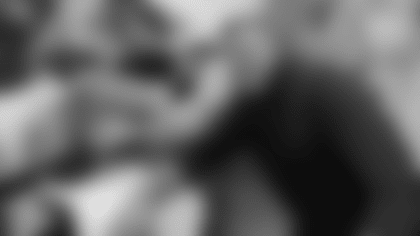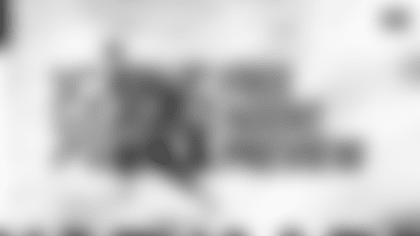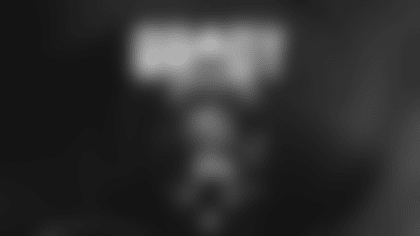[wysifield-embeddedaudio|eid="438021"|type="embeddedaudio"|view_mode="full"]
Q: Why do you think that of the three nominees this year that the fans selected you for the Patriots Hall of Fame?
KF: Well, I'm hoping that it's from my play over the course of my career, what I've done they should notice on and off the field. That's what you hope for and that's what you want them to vote you in for.
Q: Despite not being from here originally how much of a part of this community do you now feel like?
KF: A huge part. I credit New England to allowing me to grow up as a young man, not just through football but just life in general. Understanding that there is a different culture besides where I was living and to adhere to that and understand that and come back and know more about yourself as well as other people.
Q: Where were you when you received the notification that you are the Hall of Fame inductee and what was your reaction?
KF: First off, I was at a very, very familiar place. I was in the weight room working out and to get that call - Mr. [Robert] Kraft called me - it was one of those conversations. I hadn't talked with Mr. Kraft in a while and we had about a 15 minute conversation and it's pretty good to hear his voice and him congratulating me and telling me I'll be the 25th player selected to the Patriots Hall of Fame.
Q: How would you summarize your conversation with Mr. Kraft?
KF: We just talked about football. Like my career there, what I meant to the team, what I meant to the organization as well as him, his wife [Myra Kraft] and the Kraft Family.
Q: What moments stand out to you the most regarding your career here in New England?
KF: There are a number of moments. There are a number of opportunities, times in my career at New England that I could talk about. Just so many of them just pop in your head but I would have to say just the very first Super Bowl [XXXVI] being played in my home state where I actually won a state championship on that same field. That's the moment right there that you tend to think about like, 'Wow, I've got a high school state championship there and now I won the pro football championship in that same stadium'.
Q: What do you remember about the ball-security concerns that you had early in your career?
KF: It was what it was. It was a controllable situation as we can see now but I never looked at it as pressure. I just looked at it as me doing my job and I was actually asked a question - I was at a banquet last night and Drew Brees spoke - and one of the things he talked about to the young athletes was don't look at adversity as something negative. Turn it into a positive and you'll see later on in life how it affects your life and that's what it's been for me.
Q: How would you sum up what you are up to these days?
KF: Just dealing with the kids. I really enjoy it. I really enjoy seeing a kid turn around his character, his mindset, just how he carries himself. It's such a great feeling and I can credit that to a lot of stuff that I've learned over the course of my playing career through high school, college, and then especially in the pros dealing with Coach [Bill] Belichick and the New England Patriots organization.
Q: What was it inside of you that allowed you to rise to the occasion during the biggest moments of games?
KF: Just being ready, being patient, understanding that the game wasn't just about you. What you try to tell a younger athlete all the time in the sense of you can't play the game angry sometimes because you're not getting the balls or the touches that you may need or you may feel like you should get, because if you do that then you're not going to be ready when that critical situation comes up, when that opportunity that your team really needs you. You're not going to be able to make that play. You're not going to be focused for that play because you're too worried about, 'Why didn't I get the ball on this play, why didn't I get the ball on that play?', and that's one of the things that I credit to that situation.
Q: How would you define your career with the Patriots?
KF: Being the same person I was when I got there to the same person that I was when I left. Yes, I did grow as an individual but who I was as a person never changed. I just credit that to my parents growing up, the kind of culture that I grew up in, just being that humble person that understands it's just a little more not about just me.
Q: Have you gotten a chance to speak to running backs coach Ivan Fears and how much of an influence was he in your overall production as a running back?
KF: No, I haven't talked to him yet but I'm pretty sure that's conversation is going to happen later on today. But [he was] a really big influence. It goes beyond football with him. We all have things in our life that we go through as individuals and to be able to have someone with that type of knowledge and insight of pretty much who we were, because as a coach you have to understand who your players are if you want to help them out in any aspect of their life, and he understood a lot about us as individuals and to help me through some situations that didn't pertain to football. It speaks volumes for who he is as a person and you see him as wonderful husband, a wonderful dad, and it just shows you by example who you need to be as a husband, father, and as a friend.
Q: How do you think being in New England for three head coaches in Bill Parcells, Pete Carroll, and now Bill Belichick helped you see the organization grow?
KF: It's this coaching staff. Throughout those years many, many players, athletes were brought in. All of them were totally misfits. The coaching staff, the scouting department, they understood what it took to be a winner, and each year it was something different and they understood that if they got players in and they brought players in that fit in [with] what players they already had - that's one little thing that a lot of people don't see. The scouting department really helps a whole lot when they know a player they are bringing in can fit with another player they have in their organization and that speaks volumes for them.
Q: What was the greatest moment of adversity that you faced in your career?
KF: That's easy. That is easy. My mom passed away in 2004. That was singlehandedly a hard situation but I can honestly say that that situation made me a better person, made me a better father, a better husband, a better teammate. It made me an all-around better person because at that point I had to sit back and focus and understand who I really was as a person.
Q: How much did being a part of a team help you through that tough situation?
KF: It helped me a whole lot. I think I said it before, whenever something was bothering me, whenever I was upset about anything I tried to resort back to football because that was my comfort zone. That was where I could block out anything. That's where I could put anything on the back burner and God had given me ability to do wonderful things on the football field, so for me to get out there and just block everything out and play football, that was me. That was the way to get everything off of my mind.
Q: Was there ever a time that you came close to signing with another organization?
KF: Yes. After my first contract - I signed a six-year deal my first contract - and after that was up I was very close to signing with Tampa Bay. It was one of those situations where it wasn't that much more money and when it all boiled down to it, it was really like, 'Do I really want change'. Yes, sometimes change is good but change isn't good all the time and you kept hearing that it isn't greener on the other side of the fence so I decided to stay on the side of the fence that I knew very well.
Q: What did you think while watching Dion Lewis last year and what advice would you give him as he attempts to return from injury this year?
KF: I think the first thought was 'Wow, where did you come from?'. He's doing his thing. I can't believe that he looks similar; he does a lot of the same things [as me]. Coming back from the injury, he's already been a part of this situation already before so I think for him to look to anybody else I think that would be the wrong thing because you have insight on it already so I think he's going to be alright. I think he's done a lot of great things already this offseason to get his health back to the form where he knows he can perform at the NFL level, but he's an outstanding kid when you talk to him and understand who he is and where he's come from. You understand that he still has a lot to offer on the table.
Q: How much pride do you take that you established the standard in this offense for all-around productivity from the running back position?
KF: [I'm] very much prideful about it. Whenever I got the call - and it's funny - you asked that question and whenever they brought Antowain Smith in its one of those [situations] like 'Wow, I'm going to be put to the back burner. I'm going to be the third-down guy. I'm not going to be able to get as many reps or snaps that the starter would get'. I was very depressed about it but understanding longevity, understanding what it can do for your career and as time overlaps and time passes you see what it's done for you. You were able to last 13 years in the NFL as a running back in that type of offense doing some of the same things that a starter would do but you never knew that in the beginning, so it's very prideful to understand and know what that role is for this Patriots' football team and its bigger than most people think.






































